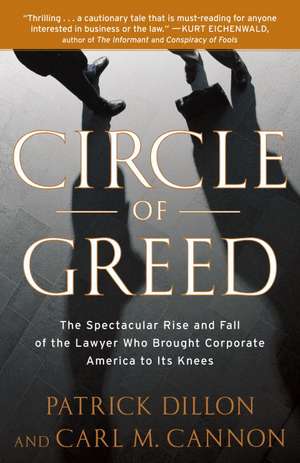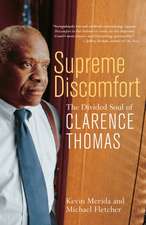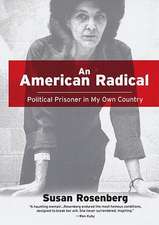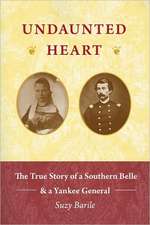Circle of Greed: The Spectacular Rise and Fall of the Lawyer Who Brought Corporate America to Its Knees
Autor Patrick Dillon, Carl M. Cannonen Limba Engleză Paperback – 31 mar 2011
If there was ever a modern Greek tragedy about a man and his times, about corporate arrogance and illusions and the scorched-earth tactics to not only counteract corporate America but to beat it at its own game, Bill Lerach's story is it.
From the Hardcover edition.
Preț: 130.27 lei
Nou
Puncte Express: 195
Preț estimativ în valută:
24.94€ • 25.66$ • 21.02£
24.94€ • 25.66$ • 21.02£
Carte disponibilă
Livrare economică 07-21 februarie
Preluare comenzi: 021 569.72.76
Specificații
ISBN-13: 9780767929950
ISBN-10: 0767929950
Pagini: 532
Dimensiuni: 132 x 203 x 31 mm
Greutate: 0.42 kg
Editura: BROADWAY BOOKS
ISBN-10: 0767929950
Pagini: 532
Dimensiuni: 132 x 203 x 31 mm
Greutate: 0.42 kg
Editura: BROADWAY BOOKS
Notă biografică
Patrick Dillon has won many journalism awards including a share of the Pulitzer Prize- and is the author of the acclaimed Lost at Sea. The executive editor of California magazine, he was formerly editor in chief of Forbes ASAP, a writer for the Christian Science Monitor, and an editor and columnist at the San Jose Mercury News. He lives in San Francisco, California.
Carl M. Cannon is the deputy editor of politicsdaily.com and coauthor of Reagan's Disciple: George W. Bush's Troubled Quest for a Presidential Legacy. He has won numerous awards, including a share of the Pulitzer Prize in 1989, and the prestigious Gerald R. Ford Prize for Distinguished Reporting of the Presidency. He lives in Arlington, Virginia.
From the Hardcover edition.
Carl M. Cannon is the deputy editor of politicsdaily.com and coauthor of Reagan's Disciple: George W. Bush's Troubled Quest for a Presidential Legacy. He has won numerous awards, including a share of the Pulitzer Prize in 1989, and the prestigious Gerald R. Ford Prize for Distinguished Reporting of the Presidency. He lives in Arlington, Virginia.
From the Hardcover edition.
Extras
1
DRAGON SLAYER
William S. Lerach first heralded himself to the elite circles in America's legal community in 1977, from the sterile downtown county courthouse on Front Street, a few blocks from the old waterfront in San Diego. The setting was Superior Court Judge JamesL. Focht's nondescript courtroom; the case, Barr v. United Methodist Church. By the time it ended, class action litigation (a single legal action on behalf of many plaintiffs against common defendants) would never be the same in California. And ultimately thevictorious lawyer would see to it that no corporate entity within the United States would be invulnerable to outside scrutiny.
No U.S. church denomination had ever been the subject of a successful class action lawsuit. The unfolding case owed its drama not only to the legal precedents at stake, or to the conflicted feelings among the litigants themselves (pious Methodists andretired ministers who found themselves suing their own denomination) but also to the intensely personal competition between the rival attorneys.
The Methodists' lead lawyer was Samuel W. Witwer, Sr., a barrel-chested eminence whose regal presence and mane of silver hair all but announced his wealth of experience. The son of a steelworker, Witwer was born in 1908, the year William Jennings Bryanran for president the third and last time. Like Bryan, Witwer came out of the Midwest, his reputation proceeding him like a billowy cloud: Harvard Law, class of 1933; lay leader in the Methodist Church; and then lawyer, who after five decades of futile effortsby others succeeded in reforming Illinois's antiquated constitution. The "Father of the Illinois Constitution," they called him. Adlai Stevenson remarked that Witwer was "a man who never quits." In 1960 the Illinois Republican Party chose Witwer to be its standard-bearerfor a U.S. Senate seat. Dwight D. Eisenhower approved of this nomination and, in a memo to Richard Nixon, referred to Sam Witwer as "a very smart man."
Nearly two decades later Witwer strode into San Diego with the air of a man accustomed to deference. He brought with him a mellifluous, authoritative-sounding basso profundo voice, the distinctive diction of a practiced orator, and an abundance of self-confidence."He was the only man I ever saw," Bill Lerach said, "who could strut while sitting down."
Witwer harbored reciprocal feelings about Lerach. The first time he ever laid eyes on the younger man, Witwer and his attorney son Samuel W. Witwer, Jr., were checking into the Westgate Plaza Hotel, San Diego's newest and finest, only to hear loud, whiskey-fueledcross-talk emanating from the lobby between Lerach and another lawyer they presumed to be Mel Weiss. "We're going to take down the Methodist Church!" Lerach boasted. Public woofing was not typical behavior of the shining lights of the San Diego bar, but Lerachwas not from that town.
Born and raised in Pittsburgh, Bill Lerach was new to the West Coast; he liked California, had come to stay, and loved being in court on this case. He was thirty-one but appeared younger with his long blond curly hair, Sundance Kid mustache, round wire-rimmedglasses, and a suit that--although tailored--looked too large on his slender frame. He was easy to underestimate. As the Pacific Homes battle played out, Samuel Witwer and the rest of the nation's corporate establishment came to see what they were up against.By dint of temperament and talent, William Shannon Lerach constituted a perfect instrument of destruction in an emerging hybrid of the legal profession: the superlawyers of the plaintiffs' bar who viewed themselves as avenging angels for the little people caston the slag heap of free enterprise. This theme would emerge more clearly in the years ahead; meanwhile the realization that in the process of attempting to reform American capitalism they could become quite rich did nothing to diminish their adversarial zeal.Quite the opposite, actually.
***
The San Diego case concerned a string of retirement facilities called Pacific Homes, established as a nonprofit corporation in 1929 for retired Methodist ministers and lay leaders. In the late 1970s the corporation was in financial trouble, a victim ofthe residents' increasing life spans, the overgenerous impulses of its founders, a flawed business plan, runaway inflation, and bad management--with some graft thrown in. The Methodist hierarchy bailed the homes out at first, but as the losses mounted, PacificHomes' officials resorted to acquiring more buildings and attracting new residents with "life-care contracts," even as they spent the money paid up front by new retirees to keep the existing retirement facilities afloat. However well intentioned the Methodistelders had been originally, they eventually found themselves running an elaborate Ponzi scheme.
The legal case began in 1977, when a Pacific Homes retiree named Frank Barr placed a call to a San Diego law firm, Wied & Granby, to which he had been referred by his estate planning attorney. Barr told the Wied & Granby attorneys his story: months afterhe had paid more than $300,000 for a "life-care contract," Pacific Homes officials had announced that all residents would have to pay several hundred dollars more each month to keep the place afloat. The homes were near bankruptcy, it seemed to Barr, and theofficials clearly had known this was the case even while soliciting the contracts. Barr told the attorneys, Colin W. Wied and James J. Granby, that some of the residents simply didn't have additional income at their disposal and were worried about losing their homes.
He had called the right lawyers. Wied and Granby were close friends who took the law, and their obligations under it, seriously. They were well situated, too, former U.S. Navy guys in a U.S. Navy town, with good educations and solid reputations in thecity's legal circles. Both would serve as president of the San Diego Bar Association, and Wied would later be named state bar president. Their only drawback was the size of their firm. Wied & Granby consisted essentially of Wied and Granby, along with a youngassociate, David J. Yardley. Nonetheless, intrigued by the case and indignant at the way their clients had been treated, they filed a lawsuit on behalf of the disgruntled Pacific Homes residents. Yet they soon realized--both because of the complexity of thecase and because of the caliber of white-shoe law firms from Los Angeles, Chicago, and Philadelphia arrayed against them--that they needed a big gun of their own.
Granby asked an attorney friend if he knew of anyone in Southern California with experience in class action litigation in which auditors had been negligent. "The firm that specializes in that kind of work is Milberg Weiss--and it has an office in San Diego,"the friend said. "They are the best in the country."
Granby placed a call to the San Diego office of Milberg, Weiss, Bershad & Specthrie, which was run by Bill Lerach. The two partners took an immediate liking to Lerach, who listened intently as they spelled out the facts of the Pacific Homes case. Lerachliked them well enough too; mainly he liked the looks of their case, so a plan was made for all of them to go to New York to secure the blessing of Lerach's boss, Milberg Weiss's co-founder and senior partner, Melvyn I. Weiss.
Weiss was initially dubious about a case that presented public relations challenges for a payoff that might not be that large. "Have you lost your mind?" Lerach remembers Weiss telling him. "We're a bunch of Jews, and you've got us suing a Christian church!Keep doing your securities cases in federal court."
Lerach, who was not himself Jewish, was undeterred. Weiss often talked this way to his young partners as a way of making them defend their prospective cases so he could see how committed they were to the litigation. In truth, Mel Weiss was intrigued byPacific Homes, and he encouraged Lerach to bring these California lawyers to New York so he could take their measure--and size up their case. Milberg Weiss's New York offices were located at One Penn Plaza, atop Penn Station. When the lawyers gathered for lunchin the building's lower level, the Californians were struck by how the tables shook and the plates rattled as the trains passed by below--and by how nothing seemed to rattle Mel Weiss.
The next day they went over the case again. This time Weiss listened intently, saying little. Finally the senior partner said, "What do you want to do?"
"Well," Wied asked, "is it a good case or not?"
After a ten-second pause, Weiss's face broke into a slow smile. "It's a dynamite case," he replied.
At that point the two law firms hashed out an agreement on the terms of their split, which they confirmed with a handshake: two-thirds of any contingency fee awarded the plaintiff's lawyers would go to Milberg Weiss, one-third to Wied & Granby. The onlything left at that point was for this bicoastal legal team to take on the venerable United Methodist Church--and win.
From the Hardcover edition.
DRAGON SLAYER
William S. Lerach first heralded himself to the elite circles in America's legal community in 1977, from the sterile downtown county courthouse on Front Street, a few blocks from the old waterfront in San Diego. The setting was Superior Court Judge JamesL. Focht's nondescript courtroom; the case, Barr v. United Methodist Church. By the time it ended, class action litigation (a single legal action on behalf of many plaintiffs against common defendants) would never be the same in California. And ultimately thevictorious lawyer would see to it that no corporate entity within the United States would be invulnerable to outside scrutiny.
No U.S. church denomination had ever been the subject of a successful class action lawsuit. The unfolding case owed its drama not only to the legal precedents at stake, or to the conflicted feelings among the litigants themselves (pious Methodists andretired ministers who found themselves suing their own denomination) but also to the intensely personal competition between the rival attorneys.
The Methodists' lead lawyer was Samuel W. Witwer, Sr., a barrel-chested eminence whose regal presence and mane of silver hair all but announced his wealth of experience. The son of a steelworker, Witwer was born in 1908, the year William Jennings Bryanran for president the third and last time. Like Bryan, Witwer came out of the Midwest, his reputation proceeding him like a billowy cloud: Harvard Law, class of 1933; lay leader in the Methodist Church; and then lawyer, who after five decades of futile effortsby others succeeded in reforming Illinois's antiquated constitution. The "Father of the Illinois Constitution," they called him. Adlai Stevenson remarked that Witwer was "a man who never quits." In 1960 the Illinois Republican Party chose Witwer to be its standard-bearerfor a U.S. Senate seat. Dwight D. Eisenhower approved of this nomination and, in a memo to Richard Nixon, referred to Sam Witwer as "a very smart man."
Nearly two decades later Witwer strode into San Diego with the air of a man accustomed to deference. He brought with him a mellifluous, authoritative-sounding basso profundo voice, the distinctive diction of a practiced orator, and an abundance of self-confidence."He was the only man I ever saw," Bill Lerach said, "who could strut while sitting down."
Witwer harbored reciprocal feelings about Lerach. The first time he ever laid eyes on the younger man, Witwer and his attorney son Samuel W. Witwer, Jr., were checking into the Westgate Plaza Hotel, San Diego's newest and finest, only to hear loud, whiskey-fueledcross-talk emanating from the lobby between Lerach and another lawyer they presumed to be Mel Weiss. "We're going to take down the Methodist Church!" Lerach boasted. Public woofing was not typical behavior of the shining lights of the San Diego bar, but Lerachwas not from that town.
Born and raised in Pittsburgh, Bill Lerach was new to the West Coast; he liked California, had come to stay, and loved being in court on this case. He was thirty-one but appeared younger with his long blond curly hair, Sundance Kid mustache, round wire-rimmedglasses, and a suit that--although tailored--looked too large on his slender frame. He was easy to underestimate. As the Pacific Homes battle played out, Samuel Witwer and the rest of the nation's corporate establishment came to see what they were up against.By dint of temperament and talent, William Shannon Lerach constituted a perfect instrument of destruction in an emerging hybrid of the legal profession: the superlawyers of the plaintiffs' bar who viewed themselves as avenging angels for the little people caston the slag heap of free enterprise. This theme would emerge more clearly in the years ahead; meanwhile the realization that in the process of attempting to reform American capitalism they could become quite rich did nothing to diminish their adversarial zeal.Quite the opposite, actually.
***
The San Diego case concerned a string of retirement facilities called Pacific Homes, established as a nonprofit corporation in 1929 for retired Methodist ministers and lay leaders. In the late 1970s the corporation was in financial trouble, a victim ofthe residents' increasing life spans, the overgenerous impulses of its founders, a flawed business plan, runaway inflation, and bad management--with some graft thrown in. The Methodist hierarchy bailed the homes out at first, but as the losses mounted, PacificHomes' officials resorted to acquiring more buildings and attracting new residents with "life-care contracts," even as they spent the money paid up front by new retirees to keep the existing retirement facilities afloat. However well intentioned the Methodistelders had been originally, they eventually found themselves running an elaborate Ponzi scheme.
The legal case began in 1977, when a Pacific Homes retiree named Frank Barr placed a call to a San Diego law firm, Wied & Granby, to which he had been referred by his estate planning attorney. Barr told the Wied & Granby attorneys his story: months afterhe had paid more than $300,000 for a "life-care contract," Pacific Homes officials had announced that all residents would have to pay several hundred dollars more each month to keep the place afloat. The homes were near bankruptcy, it seemed to Barr, and theofficials clearly had known this was the case even while soliciting the contracts. Barr told the attorneys, Colin W. Wied and James J. Granby, that some of the residents simply didn't have additional income at their disposal and were worried about losing their homes.
He had called the right lawyers. Wied and Granby were close friends who took the law, and their obligations under it, seriously. They were well situated, too, former U.S. Navy guys in a U.S. Navy town, with good educations and solid reputations in thecity's legal circles. Both would serve as president of the San Diego Bar Association, and Wied would later be named state bar president. Their only drawback was the size of their firm. Wied & Granby consisted essentially of Wied and Granby, along with a youngassociate, David J. Yardley. Nonetheless, intrigued by the case and indignant at the way their clients had been treated, they filed a lawsuit on behalf of the disgruntled Pacific Homes residents. Yet they soon realized--both because of the complexity of thecase and because of the caliber of white-shoe law firms from Los Angeles, Chicago, and Philadelphia arrayed against them--that they needed a big gun of their own.
Granby asked an attorney friend if he knew of anyone in Southern California with experience in class action litigation in which auditors had been negligent. "The firm that specializes in that kind of work is Milberg Weiss--and it has an office in San Diego,"the friend said. "They are the best in the country."
Granby placed a call to the San Diego office of Milberg, Weiss, Bershad & Specthrie, which was run by Bill Lerach. The two partners took an immediate liking to Lerach, who listened intently as they spelled out the facts of the Pacific Homes case. Lerachliked them well enough too; mainly he liked the looks of their case, so a plan was made for all of them to go to New York to secure the blessing of Lerach's boss, Milberg Weiss's co-founder and senior partner, Melvyn I. Weiss.
Weiss was initially dubious about a case that presented public relations challenges for a payoff that might not be that large. "Have you lost your mind?" Lerach remembers Weiss telling him. "We're a bunch of Jews, and you've got us suing a Christian church!Keep doing your securities cases in federal court."
Lerach, who was not himself Jewish, was undeterred. Weiss often talked this way to his young partners as a way of making them defend their prospective cases so he could see how committed they were to the litigation. In truth, Mel Weiss was intrigued byPacific Homes, and he encouraged Lerach to bring these California lawyers to New York so he could take their measure--and size up their case. Milberg Weiss's New York offices were located at One Penn Plaza, atop Penn Station. When the lawyers gathered for lunchin the building's lower level, the Californians were struck by how the tables shook and the plates rattled as the trains passed by below--and by how nothing seemed to rattle Mel Weiss.
The next day they went over the case again. This time Weiss listened intently, saying little. Finally the senior partner said, "What do you want to do?"
"Well," Wied asked, "is it a good case or not?"
After a ten-second pause, Weiss's face broke into a slow smile. "It's a dynamite case," he replied.
At that point the two law firms hashed out an agreement on the terms of their split, which they confirmed with a handshake: two-thirds of any contingency fee awarded the plaintiff's lawyers would go to Milberg Weiss, one-third to Wied & Granby. The onlything left at that point was for this bicoastal legal team to take on the venerable United Methodist Church--and win.
From the Hardcover edition.
Recenzii
“John Grisham would have to struggle to invent a character as brilliant and unethical as Bill Lerach. It is a credit to the reporting talents of Patrick Dillon and Carl M. Cannon that, in “Circle of Greed,” they capture the felon-lawyer in all his charm and ruthlessness. Along the way they show how the plaintiffs' bar has transformed the process of class actions into big business.”
— Wall Street Journal
“[A] revelatory yarn . . . In “Circle of Greed,” the authors do justice to their subject and have produced a book that proves the adage that truth can be stranger than fiction.”
— Washington Times
“Mr. Dillon and Mr. Cannon have written the type of book that, like “Den of Thieves” and “Smartest Guys in the Room,” helps to explain an era.”
— NYTimes.com/DealBook
“In Circle of Greed , this compelling narrative becomes an irresistible metaphor for the hubris at the heart of capitalism . . . Lerach is lucky to have Pulitzer Prize-winning journalists Patrick Dillon and Carl Cannon as his chroniclers. They tell his tale with an authority and depth that comes from having followed his career since the late 1970s. . . Amid the entertaining knockabout and big personalities, the authors raise important questions about how the rule of law should work in a capitalist democracy.”
— Financial Times
“[R]iveting . . . Telling this complex story is a tricky business, but Circle of Greed is up to the task: it is impressively researched and well paced, and offers reporting, not editorializing, leaving the reader to form his or her own judgments.”
— Washington Monthly
"A well-reported, densely written saga" --Kirkus Reviews
"In modern corporate America, the swashbuckling captains of industry have long been the primary characters exposed in the public storytelling. But now, Patrick Dillon and Carl Cannon have stripped away the veneer of a lawyer who made his name as the business world’s chief adversary, Bill Lerach. In Circle of Greed, Dillon and Cannon present a painstakingly researched and entertaining tale of a legal dynamo who seemed able to root out any corporate crime, but then became enmeshed in frauds of his own. Lerach had it all, then lost it all because of his own greed and arrogance. In this thrilling book, Dillon and Cannon have unwound the character of this perplexing man, presenting a cautionary tale that is must-reading for anyone interested in business or the law."
--Kurt Eichenwald, author of The Informant and Conspiracy of Fools
From the Hardcover edition.
— Wall Street Journal
“[A] revelatory yarn . . . In “Circle of Greed,” the authors do justice to their subject and have produced a book that proves the adage that truth can be stranger than fiction.”
— Washington Times
“Mr. Dillon and Mr. Cannon have written the type of book that, like “Den of Thieves” and “Smartest Guys in the Room,” helps to explain an era.”
— NYTimes.com/DealBook
“In Circle of Greed , this compelling narrative becomes an irresistible metaphor for the hubris at the heart of capitalism . . . Lerach is lucky to have Pulitzer Prize-winning journalists Patrick Dillon and Carl Cannon as his chroniclers. They tell his tale with an authority and depth that comes from having followed his career since the late 1970s. . . Amid the entertaining knockabout and big personalities, the authors raise important questions about how the rule of law should work in a capitalist democracy.”
— Financial Times
“[R]iveting . . . Telling this complex story is a tricky business, but Circle of Greed is up to the task: it is impressively researched and well paced, and offers reporting, not editorializing, leaving the reader to form his or her own judgments.”
— Washington Monthly
"A well-reported, densely written saga" --Kirkus Reviews
"In modern corporate America, the swashbuckling captains of industry have long been the primary characters exposed in the public storytelling. But now, Patrick Dillon and Carl Cannon have stripped away the veneer of a lawyer who made his name as the business world’s chief adversary, Bill Lerach. In Circle of Greed, Dillon and Cannon present a painstakingly researched and entertaining tale of a legal dynamo who seemed able to root out any corporate crime, but then became enmeshed in frauds of his own. Lerach had it all, then lost it all because of his own greed and arrogance. In this thrilling book, Dillon and Cannon have unwound the character of this perplexing man, presenting a cautionary tale that is must-reading for anyone interested in business or the law."
--Kurt Eichenwald, author of The Informant and Conspiracy of Fools
From the Hardcover edition.









